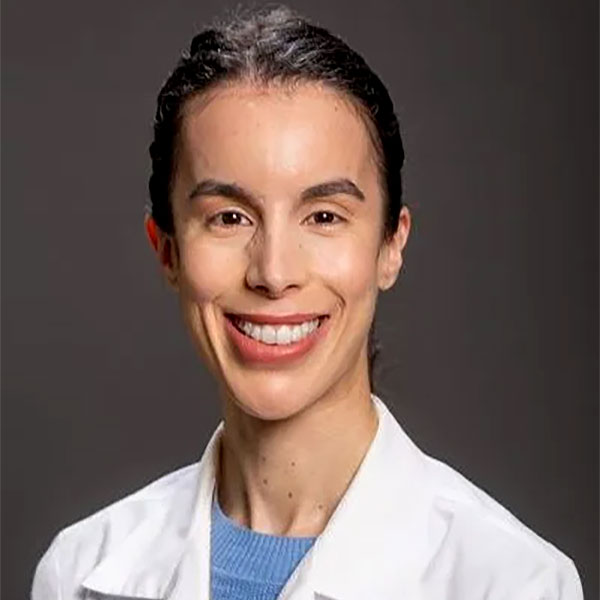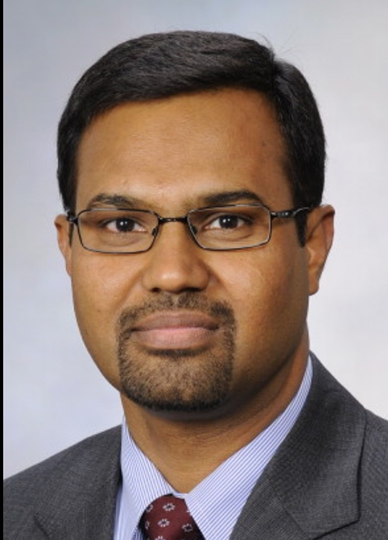
QI Scholars
The QI Scholars Program is a highly interactive advanced training program in QI research methods and leadership skills, centered around an improvement project of each Scholar’s choosing.
Scholars receive dedicated mentorship and data and statistics support and enjoy the opportunity to engage with nationally known improvement experts. This training allows Scholars to pursue careers in academic quality improvement while building operational leadership skills.
Seattle Children’s Hospital started the QI Scholars Program in 2016, which expanded to include the first cohort of UW Medicine participants in 2021. The program is now jointly run, creating a cross-fertilization of ideas and innovation.
Congratulations to the 2024/2025 QI Scholars from the Department of Medicine:
Efstathia Andrikopoulou, MD
 Dr. Efstathia Andrikopoulou is an associate professor of medicine in the Division of Cardiology and the medical director of the Echocardiography Lab at Harborview Medical Center.
Dr. Efstathia Andrikopoulou is an associate professor of medicine in the Division of Cardiology and the medical director of the Echocardiography Lab at Harborview Medical Center.
She completed her internal medicine training at Thomas Jefferson University in Philadelphia, cardiology fellowship at the University of Alabama at Birmingham (UAB), and advanced multimodality cardiovascular imaging training at Brigham and Women's Hospital in Boston. She also holds an MBA from UAB.
Andrikopoulou is an expert in Cardiovascular Imaging with a clinical niche in Cardio-Oncology. She is a rising leader in the space of artificial intelligence. Driven by a deep commitment to delivering excellent, equitable care to all patients, Andrikopoulou focuses on developing and implementing innovative clinical programs, processes, and workflows.
She is passionate about creating tools and solutions that ensure high-quality care is accessible to patients and communities regardless of their socioeconomic background, making her a rising leader in healthcare innovation and quality improvement.
Project Overview
This project aims to reduce the incidence of no-shows and same-day cancellations for outpatient appointments at the UW Medicine Echocardiography labs. By conducting a comprehensive analysis of patient demographics, behaviors, and socioeconomic factors, we will identify predictors of no-shows and cancellations. Our goal is to develop targeted interventions that optimize scheduling efficiency and improve patient engagement, thereby enhancing overall quality of care delivery and operational efficiency in our Echocardiography labs.
Stephanie Kim, MD, MPH
 Dr. Stephanie Kim is a clinical assistant professor in the Division of Metabolism, Endocrinology, and Nutrition and the associate director of the UW Diabetes Institute Clinical Research Unit.
Dr. Stephanie Kim is a clinical assistant professor in the Division of Metabolism, Endocrinology, and Nutrition and the associate director of the UW Diabetes Institute Clinical Research Unit.
She earned her bachelor's degree in molecular and cellular biology from the University of California, Berkeley before pursuing medical school at Texas A&M School of Medicine. She completed residency in internal medicine at Kaiser Permanente Northern California and fellowship in Diabetes, Endocrinology, and Metabolism at the University of California, San Francisco. Her clinical and scholarly interests focus on diabetes education and technology.
Project Overview
The LatinX population is disproportionately affected by diabetes, related complications, and challenges in accessing medical care. Telemedicine has the potential to increase access to care; however, its use may be lower among LatinX patients. This project aims to identify barriers that contribute to reduced telemedicine use among LatinX patients at the UW LatinX Diabetes Clinic. It will also evaluate whether eliminating these identified barriers increases telemedicine use among LatinX patients and leads to improved outcomes, such as glycemic control and greater use of diabetes technology.
Laura Spece, MD, Msc
 Dr. Laura Spece is an assistant professor in the Division of Pulmonary and Critical Care Medicine, the director of Pulmonary Operations for the VA Puget Sound Health Care System, and the medical co-director of the Pulmonary VA-ECHO national provider educational program.
Dr. Laura Spece is an assistant professor in the Division of Pulmonary and Critical Care Medicine, the director of Pulmonary Operations for the VA Puget Sound Health Care System, and the medical co-director of the Pulmonary VA-ECHO national provider educational program.
She has completed additional training in Health Services Research and Epidemiology through the UW School of Public Health and has expertise in implementation science through the NIH National Heart, Lung, Blood Institute (NHLBI) and Center for Translation Research and Implementation Science (CTRIS) K12 program.
She currently spends most of her clinical time in outpatient Pulmonary and Lung Transplant clinics. Her scholarly work focuses on health program redesign, implementation, and evaluation to improve access to high quality pulmonary care for all patients; with a goal to overcome systematic, racial, and geographic barriers that hinder care delivery.
Project Overview
Patient access to pulmonary specialty care is limited. Many requests for pulmonary function testing and consultation with specialists are cancelled due to failure to schedule (~45%) within the VA Puget Sound Health Care System, related to long wait times and geographic barriers. These barriers to specialty care creates a care gap for veterans with chronic lung disease, and places additional strain on our colleagues in primary care.
The demand for pulmonary services are increasing with the recent passage of the Promise to Address Comprehensive Toxins (PACT) Act because 11 respiratory conditions, including asthma and chronic obstructive pulmonary disease (COPD), are presumptively service-connected among combat-deployed Veterans. We need health system interventions to close the gap, improve access and patient outcomes.
The goal of this project is to improve access to pulmonary specialty care and consult completion using an RN-driven consult triage tool (Decision Support Tool, DST) packaged with a COPD/Asthma asynchronous consultation pathway.
Prakash Vishnu, MD
 Dr. Prakash Vishnu is an associate professor in the Division of Hematology and Oncology, and an attending physician and affiliate investigator Fred Hutch Cancer Center.
Dr. Prakash Vishnu is an associate professor in the Division of Hematology and Oncology, and an attending physician and affiliate investigator Fred Hutch Cancer Center.
After graduating from Bangalore Medical College, Dr. Vishnu completed post-graduation at University of Auckland, New Zealand. He completed residency training in Internal Medicine at Wayne State University, and fellowship in Hematology and Medical Oncology at Mayo Clinic, where he also served as a faculty. He also was a fellow at the Mayo Clinic Quality Academy and Virginia Mason Institute.
Board-certified in Internal Medicine, Hematology, and Medical Oncology, he practices systems-based hematology, and has clinical expertise in treating thrombotic and hemorrhagic disorders, hemoglobin disorders, thrombocytopenia, disorders of iron metabolism and rare genetic hematologic diseases.
He is a Fellow of the American College of Physicians and member of the American Society of Hematology, and International Society of Thrombosis and Hemostasis. He has published more than 60 peer-reviewed articles and book chapters in the area of hematology and oncology, and presents lectures at various regional, national, and international society meetings.
Project Overview
This project is aimed at standardizing the testing and treatment protocols for hemophagocytic lymphohistiocytosis (HLH) at the University of Washington/Fred Hutch Cancer Center. HLH is a life-threatening condition with variable presentations, often leading to delayed diagnosis and inconsistent treatments.
The project goals include developing a diagnostic algorithm and treatment protocol, training healthcare providers, and improving patient outcomes.
Key objectives: 1) Create a standardized diagnostic algorithm in the hospital's Epic system, 2) Develop treatment protocols based on evidence-based guidelines in the Beacon system, 3) Train healthcare providers on these protocols, and 4) Monitor and measure the outcomes, such as time to diagnosis, treatment initiation, and patient survival rates.
A multidisciplinary team, including hematologists, IT specialists, and quality improvement experts, will be assembled to develop, implement, and refine these protocols. The project will follow a structured approach, including pilot testing, data collection, analysis, and adjustments. The ultimate aim is to integrate the successful protocols into routine practice and disseminate them to other institutions.
Trang Vu, md, mph
 Dr. Trang Vu is an assistant professor in the Division of General Internal Medicine, and currently serves as the medical director of the General Internal Medicine Clinic (GIMC) at Roosevelt.
Dr. Trang Vu is an assistant professor in the Division of General Internal Medicine, and currently serves as the medical director of the General Internal Medicine Clinic (GIMC) at Roosevelt.
A recent transplant to the west coast, Vu spent the majority of her life in Baltimore, MD, where she attended medical school and completed residency at Johns Hopkins. She also worked in New York City for five years and obtained a Master's in Public Health from Columbia University.
Double-boarded in internal medicine and addiction medicine, her clinical interests focus on improving health outcomes and patient experience for individuals with substance use disorders in primary care.
Project Overview
Many patients seen at the UW Montlake General Internal Medicine Clinic (GIMC) are on chronic controlled medication such as opioids, benzodiazepines, and stimulants. However, there is currently no existing dashboard to enumerate and track patients on such medications and to aid in their management. As well, there remains much practice variation in how these medications are managed.
My proposed project aims to create and implement a tiered, risk-based protocol to systematize and better manage patients who are prescribed chronic controlled medications (opioids, benzodiazepines, and stimulants) at GIMC.
The goal is that patients with higher safety risks will have more safety monitoring parameters. To better understand the prescribing practices of our providers, and to evaluate the impact of the tiered risk-based protocol, the project also includes the plan to develop a controlled medication dashboard within EPIC.